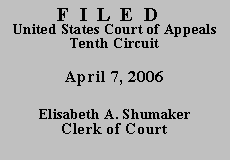

|
UNITED STATES OF AMERICA, |
|
Before MURPHY, SEYMOUR and McCONNELL, Circuit Judges.
Defendant-appellant, Augustine Cruz-Lopez was charged in a three-count, superseding information with drug and immigration crimes. Pursuant to the terms of an agreement with the government, Cruz-Lopez pleaded guilty to two of those counts; the third count was dismissed on the government's motion. On October 12, 2004, Cruz-Lopez was sentenced to seventy months' incarceration. Nearly one year later, on September 6, 2005, Cruz-Lopez filed a motion seeking a free transcript of the criminal proceedings "in order to proceed with his appeal." The district court denied the motion, concluding Cruz-Lopez had not brought a direct appeal in this matter and the time for bringing an appeal had run.
Cruz-Lopez filed this appeal from the district court's order denying him the free transcript. In his opening brief, he concedes he did not file a direct criminal appeal but argues, for the first time, that he needs the transcript to assist him in preparing a motion for post-conviction relief under 28 U.S.C. § 2255. Although an indigent criminal defendant has an absolute right to a transcript on direct appeal, our review of the record confirms that Cruz-Lopez has never filed a direct appeal. See Ruark v. Gunter, 958 F.2d 318, 319 (10th Cir. 1992). Because there is no similar constitutional right to a free transcript in post-conviction proceedings, Cruz-Lopez must file a separate motion in his § 2255 proceeding demonstrating that his claims are "not frivolous and that the transcript is needed to decide the issue presented by the suit." Sistrunk v. United States, 992 F.2d 258, 259 (10th Cir. 1993).
Because Cruz-Lopez did not file a direct appeal, we conclude the district court did not err when it denied Cruz-Lopez's motion seeking a free transcript and, accordingly, we affirm the district court's order. Cruz-Lopez's motion to proceed in forma pauperis on appeal is denied.
ENTERED FOR THE COURT
Michael R. Murphy
Circuit Judge
*. This order and judgment is not binding precedent, except under the doctrines of law of the case, res judicata and collateral estoppel. The court generally disfavors the citation of orders and judgments; nevertheless, an order and judgment may be cited under the terms and conditions of 10th Cir. R. 36.3.